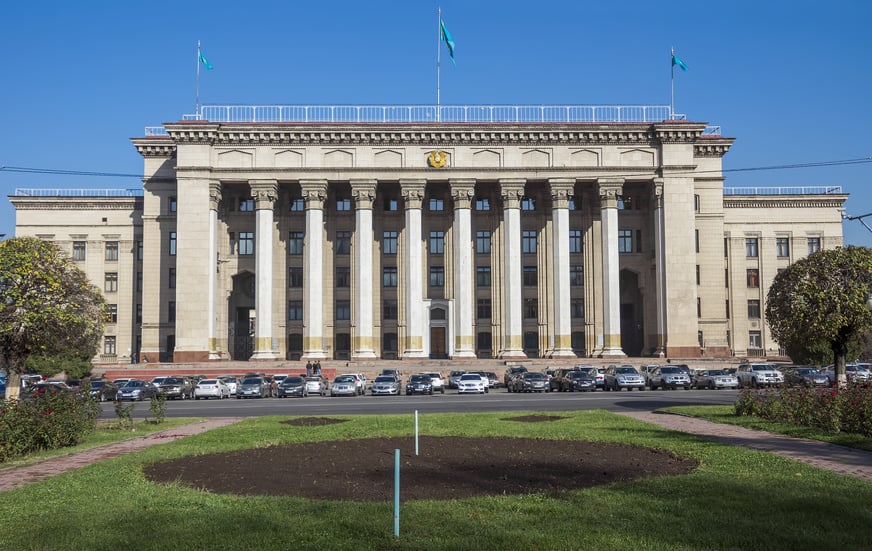This Legal Alert updates Kazakhstan’s response to COVID-19 subsequent to the 15 March Decree of the President announcing a State of Emergency as described in greater detail in Baker McKenzie’s Legal Alert dated 16 March 2020.
On Tuesday, 17 March 2020, the State of Emergency Commission established to respond to the COVID-19 virus in Kazakhstan published a notice on the web-site of the Prime Ministeri introducing a quarantine regime in Almaty, the country’s largest city, and Nur-Sultan, the country’s capital, starting from 00:00 19 March 2020.
1. Quarantine Measures
According to the Commission’s Quarantine Notice, certain quarantine related measures will be imposed in both cities, including the following:
- a quarantine will be introduced and large-scale sanitary and anti-epidemic measures will be taken;
- perimeters of the quarantine zone around each city will be established, along with entry/exit points;
- restrictions will be placed on the movement of people, as well as the entry/exit of transport;
- operations of non-food trading markets and large shopping centers will be suspended (closed), with the exception of facilities selling food and medicines in them;
- restaurants are to use only the “delivery to customers” mode of operating.
2. Published Clarifications
(1) Prime Minister’s Office
According to further clarifications published also on the web-site of the Prime Minister on 17 March,ii restrictions on entry/exit to both cities will not apply to a number of cases including the following:
- residents of Almaty and Nur-Sultan who were out of town when the quarantine took effect may return home;
- residents of other regions who entered Almaty or Nur-Sultan before the quarantine may return home;
- foreigners who were in Kazakhstan when the quarantine took effect may exit Kazakhstan;
- citizens of Kazakhstan who have previously left the country, may return home;
- citizens of Kazakhstan may travel abroad for treatment upon presentation of supporting documents of healthcare institutions.
(2) Akimats
The akimat (Mayor’s office) of both Almaty and Nur-Sultan issued a number of clarifications of the Quarantine Notice on 18 March.
Among other things, the Almaty akimat announced that 27 security checkpoints will be set up around the city’s perimeter to check all traffic and persons entering/exiting the city. It also reiterated that, as set forth in the Quarantine Notice, the operations of trade and entertainment centers will be suspended, except for food stores and pharmacies in them.iii
Similarly, the Nur-Sultan Akimat announced that entrance and exit security checkpoints will be established on the city’s perimeter and that the operations of trade and entertainment centers will be suspended, except for food and pharmacies in them, as well as the operation of kindergartens.iv
3. 18 March 2020 Notice of Almaty Akimat Sealing Off Almaty
Late in the afternoon of 18 March, the Almaty Akimat went further by effectively sealing off Almaty from the rest of the country. Specifically the Almaty Akimat announced in a briefing that, as of 00:00 local time on 22 March 2020, all air and rail connections to and from Almaty will cease. It states that Almaty residents must return to the city, and persons in Almaty who want to leave the city, must do so within 72 hours.v Although the wording of this announcement is not entirely clear, it appears to apply only to connections to other points in Kazakhstan and not to points outside of Kazakhstan.
The Akimat’s announcement states that vehicles will be permitted to enter Almaty only to the extent necessary for the life and order of the city. But it states that the movement of people and vehicles within Almaty will not be limited.vi
As of the issuance of this Legal Alert, no such steps have been announced by the Nur-Sultan Akimat.
4. Baker McKenzie Comments
The actions described above appear to be the Government’s attempt the limit outbreak of COVID-19 to Kazakhstan’s two principal cities, which are the only locations where there are confirmed cases of COVID-19 so far. Several points should be noted:
- At the present time, a shelter-in-place regime has not been imposed in either Almaty or Nur-Sultan. People are free to leave their homes and move about the city, although most public venues are closed and public transport has been reduced. At the present time, residents may travel through each city and are not limited to a particular sector.
- At the present time, there is no restriction on the operation of most businesses (other than stores, shopping centers, etc.) which have been specifically closed. However, employers must make every effort to prevent the spread of COVID-19 in the workplace so, in practice, many businesses which are able to do so are using alternative working arrangements (e.g., remote (distance) working).
- Both the Quarantine Notice and the subsequent clarifications of the Almaty and Nur-Sultan akimats make it absolutely clear that “large objects of trade” and “shopping and entertainment centers” are to fully close, except to the extent they contain food stores or pharmacies. This seems intended to stop the practice of local officials of allowing such facilities to remain open with slightly shortened hours once any entertainment venues in them have been closed.
Coronavirus Resource Center
Baker McKenzie has launched Coronavirus Resource Center, where you will find all of our materials regarding COVID-19, categorized by region. It continues to be built out daily.
This LEGAL ALERT is issued to inform Baker McKenzie clients and other interested parties of legal developments that may affect or otherwise be of interest to them. The comments above do not constitute legal or other advice and should not be regarded as a substitute for specific advice in individual cases.
i https://primeminister.kz/ru/news/goskomissiya-po-obespecheniyu-rezhima-chp-pri-prezidente-rk-vvela-rezhim-karantina-v-gorodah-nur-sultan-i-almaty-s-19-marta-tg-172930 (the “Quarantine Notice”). As of the issuance of this Alert, there is not yet an official published document.
ii https://primeminister.kz/ru/news/ob-ogranicheniyah-na-vezd-vyezd-v-iz-gorodov-nur-sultan-i-almaty-172613
iii https://www.zakon.kz/5012075-chto-skazal-sagintaev-o-vvedenii.html
iv http://astana.gov.kz/ru/news/news/21975
v https://www.zakon.kz/5012292-s-22-marta-almaty-zakroyut.html
vi https://www.zakon.kz/5012282-almatintsy-smogut-bez-ogranicheniy.html



